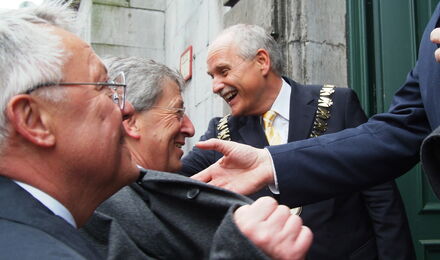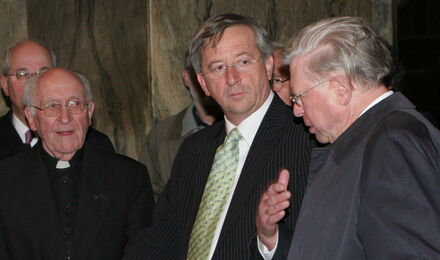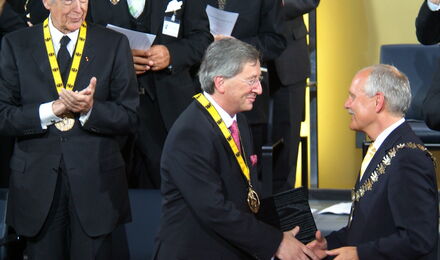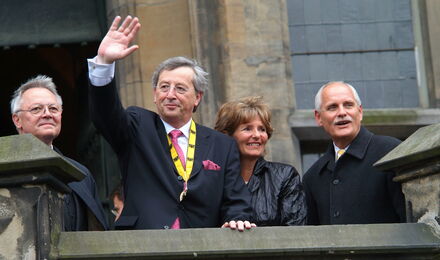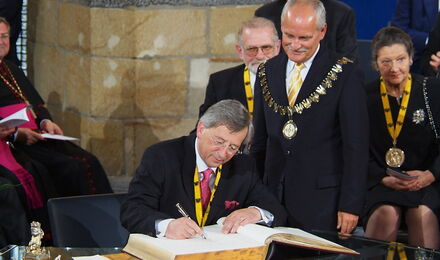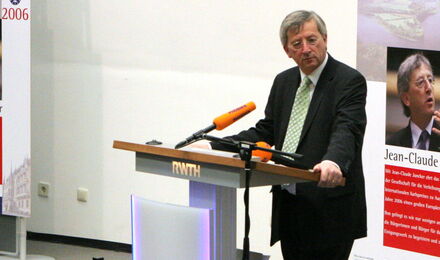The presentation of the International Charlemagne Prize of Aachen to the Prime Minister of the Grand Duchy of Luxembourg, Dr Jean-Claude Juncker:
‘An organisation without a soul is dead. A united Europe needs a soul.’ These words of Jacques Delors, winner of the Charlemagne Prize in 1992, emphasise the essential. Looking beyond many of the current issues, it is important to consider what holds Europe together at its core and what defines the community's place in the world to a very significant extent: The European Union is the greatest and most successful attempt to create and secure peace and freedom across the entire continent; a peace in freedom that is not based on the balance of power, but on the commonality of values and institutions.
Nevertheless, it is obvious that a truly common European identity does not yet exist, and that a great distance remains between the citizens in the member states and their European institutions. This gives rise to feelings of insecurity, fear, worry and expectation, which must be taken seriously. More than ever, the European Union needs an open dialogue between politicians and the public. And more than ever, it needs visionary leaders who can win the public over to the European project; creators who can see and recognise the opportunities that a united Europe offers its citizens and implement them in practical policies.
In recognition of his role as a driving force and key player in almost all of the integration progress of the past two decades, as a mediator, mediator and bridge-builder between politics and the people as well as between the very different members of the community, and in recognition of his role as a pioneer of the United Europe of the future, the Board of Directors of the Society for the Conferring of the International Charlemagne Prize of Aachen honours the Head of Government of the Grand Duchy of Luxembourg, Prime Minister Dr. h.c. Jean-Claude Juncker.
‘Those who doubt, who despair of Europe, should visit military cemeteries.’ With this sentence, Juncker forcefully reminds us that peace in Europe cannot be taken for granted. The older generation had to learn this the hard way. In his opinion, Europeans ’are not proud enough of what the war generation built from the ashes.’ For today's youth, war between EU member states is unthinkable – and rightly so. And when Jean-Claude Juncker explains why he always wants to be there when an attempt is made to create more Europe, it is these very fundamental considerations that drive the head of government of the smallest founding member of the EU.
Although he is only 51 years old, Juncker has played a more decisive role in the further development of the European integration process than any other head of government: in 1986 with the Single European Act, which led to the single market; in 1992 with the Maastricht Treaty, when the European Union replaced the European Community and the decision was taken to establish a monetary union and introduce a common foreign and security policy; in 1996 with the agreement of the Stability and Growth Pact, in December 2000 with the Treaty of Nice, a year later with the establishment of the Convention, in December 2002, when the comprehensive unification of our continent was finally decided in Copenhagen, as well as in the past year 2004, the year of enlargement and the signing of the Constitutional Treaty. In all these integration steps, Juncker was the driving force and a decisive player in the effort to balance European and different national interests. He passionately and convincingly represents his vision of an economically strong, innovative, but equally socially just Europe.
Jean-Claude Juncker was born on 9 December 1954 in Rédange-sur-Attert, the son of a steelworker. After studying law at the University of Strasbourg, he initially worked as a lawyer and then – on a part-time basis – joined the Christian Social People's Party (CSV) as parliamentary group secretary.
At the end of 1982, the then head of government Pierre Werner appointed the then 28-year-old as Secretary of State for Labour and Social Security in his government. In June 1984, he was elected to the Luxembourg parliament for the first time. Juncker was able to quickly expand his responsibilities and sphere of influence and was appointed Minister of Labour and Minister Delegate to the Minister of Finance with responsibility for state budget issues. In 1989, he was appointed Minister of Labour and Finance, finally becoming the ‘second man’ behind the new head of government, his friend and patron Jacques Santer. In the parliamentary elections of June 1994, the People's Party, which Juncker had been elected president of four years earlier, was able to maintain its leading position. When Prime Minister Santer succeeded Jacques Delors as President of the European Commission in 1995, Juncker was elected Prime Minister of Luxembourg as expected on 26 January 1995. In this role, he also retained his previous departments and took on the Treasury in addition.
Immediately after taking office, Juncker announced a more active European policy and strongly opposed any watering down of the Maastricht Treaty and the convergence criteria for monetary union. He attracted widespread international attention at the Dublin EU summit in December 1996, when he helped to push through the Stability and Growth Pact, which had been largely initiated by Theo Waigel and Carlo Ciampi. ‘It didn't hurt that Juncker knows more about monetary union than all the other prime ministers and chancellors combined,’ noted political observers respectfully at the time (taz, 20 December 1996). When the finance ministers of the monetary union agreed in 2004 on a longer-term presidency for the eurozone, it was no surprise that Jean-Claude Juncker was chosen. He took up the post on 1 January 2005 for a period of two years and was able to put an end to a long period of monetary uncertainty with a moderate reform of the Stability Pact as early as March 2005.
Although it was praised for the extremely effective organisation, the Luxembourg EU Council Presidency in the first half of 2005 was less successful. Despite the best efforts of the head of government, an agreement on the financial perspective for 2007 to 2013 was temporarily postponed; after the failed referenda in France and the Netherlands, a ‘period of reflection’ was also agreed with regard to the Constitutional Treaty, which had only been signed in October 2004 but had not yet been ratified by all member states. During this time of crisis for the EU, Jean-Claude Juncker once again demonstrated steadfastness, persistence and a forceful power of persuasion. Unlike some of his colleagues in other member states, he stuck to the planned referendum on the constitution in the Grand Duchy and linked his political future to a positive vote by his fellow citizens. In the first national referendum since 1937, the people of Luxembourg followed their head of government and sent a clear signal in favour of the constitution with almost 57% approval.
Jean-Claude Juncker has already received numerous awards, in particular for his European achievements, including ‘European of the Year 2003’, ‘Grand Officier de la Légion d Hon Honeur’, the Iron Cross of the State of Romania and, most recently, the Walter Hallstein Prize. He also holds an honorary doctorate from the University of Münster, among other things. The polyglot Prime Minister, who is fluent in five languages, has been married to Christiane Frising since 1979.
Jean-Claude Juncker, who was impressively re-elected in 1999 by a Christian-liberal coalition and again in 2004 by a Christian-socialist coalition, is one of a series of prominent European politicians from his country, such as Joseph Bech, Pierre Werner and Jacques Santer, who have repeatedly combined national interests with European integration policy goals. He confidently rejects any ‘geo-demographic teaching’ about the size of his home country: ‘For as long as I can remember, I have known that Luxembourg is a small country.’ But ‘in the institutional life of Europe, it is the same as in zoology: a flea can drive a lion mad. However, there is no example of a lion driving a flea mad. In this respect, one should strive for the right balance between large and small.’
And so the Luxembourger is one of the Union's thought leaders even when it comes to topics in which his home country is truly not seen as playing a leading role – such as foreign and security policy: ‘It is imperative that we come to more common ground in matters of European security, European defence and foreign policy, that we reflect more firmly than before on our European responsibility and formulate and execute a common policy. What applies to foreign and security policy is also true for European development aid. [...] The international economic order remains fundamentally unjust, and the Europeans have a major contribution to make to making things fairer and simpler for people. That is why development aid is also a European project. The European Union should serve as a model for the whole world in this regard. That is why we in Europe must ensure that the contributions we are able to make to the rest of the world also match our ambitions for ourselves. That is why this external impact of the European Union is something that can very well also have an inwardly meaningful effect. We must shape Europe in such a way that Europeans can be proud of Europe again. You can only be proud of yourself if you can make a difference for others too.’
The Grand Duchy of Luxembourg is also one of the few countries in the world to provide more than the 0.7 per cent of its gross national product earmarked by the United Nations for development aid.
For the Luxembourger, European policy is a matter close to his heart, and it is ‘not just about political programmes and declarations of principle. It is also about people. You cannot get anything off the ground for Europe if you do not love people [...] Those who count nations like huge demographic herds, without seeing that they are about real people, cannot shape the future.’
In awarding the 2006 International Charlemagne Prize of Aachen to Jean-Claude Juncker, the Board of Directors of the Society for the Conferring of the International Charlemagne Prize of Aachen honours a great European who, in the best tradition of the people of Luxembourg, is a credible, competent, persistent and passionate driving force and pioneer of the integration process, and who, like few others, has succeeded in inspiring and winning over citizens for the European unification movement.






